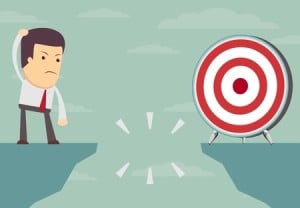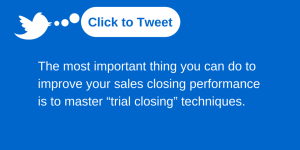The most important thing you can do to improve your sales closing performance is to master “trial closing” techniques.
Trial closing achieves two critical things:
- It tells you where you are in the sales process
- It tells you when to ask for the sale
For example, let’s say you are shopping for a smartphone. You go into the store and the salesperson greets you. She finds out what you are looking for and begins to demo the voice activation feature on one of the smartphone models. When she finishes showing you how the voice activation feature works, she asks “what do you think about this voice activation?” That’s a great trial close question.
Trial Closing Questions – the Salesperson’s MVT (Most Valuable Tool)

The trial close is the salesperson’s MVT. It’s like a thermometer or blood pressure cuff – it’s a critical diagnostic tool used to assess a situation…or better yet, assess how the prospect feels about the product or service you are selling.
During your time with a prospect, you should constantly be taking his/her “temperature” to determine if they are cold, warm or hot; and react accordingly.
Without the trial close the salesperson is lost, and whether or not a salesperson learns to trial close will have more impact on his/her closing ratio than any other skill a salesperson can learn.
Salespeople should practice trial closing until it becomes an instinctive part of the sales process. Since the number one goal of a professional salesperson is to achieve a 100% close ratio, effective trial closing will get you there faster and easier than any other sales technique.
Trial Closing is not the same as Asking for the Sale
Here’s the difference between asking for the sale and trial closing:
Asking for the Sale: “If I can get you the payment terms you are seeking, will you decide to buy?” Clearly this is asking for the ultimate buying decision.
Trial Closing: “How do you feel about the payment terms?” You are not asking for the sale but rather asking how the prospect feels about one element of the sale.
Why is Trial Closing So Important?

In my experience as a professional sales consultant and sales trainer, I’ve seen far too many examples of salespeople talking about their product/service and then asking for the sale. As such, most salespeople don’t really know where they are in the sales process. When they try to close the deal there are too many impediments or unanswered questions on the part of the buyer and the answer is “no”. The salesperson doesn’t like the word “no” and doesn’t know how to respond, so he/she walks away with another lost opportunity.
The first reason to trial close is to understand where you are in the sales process so you know what is important to the buyer and where to take the conversation. Remember the previous example of the thermometer – if you don’t take the patient’s temperature during the diagnosis and ask about symptoms, then how can you determine what to prescribe? You just can’t make a sound diagnosis or ask for a decision from a buyer if you don’t know where you are in the process.
The second reason to trial close is to find out when it is appropriate to ask for the sale. Knowing when to ask for the sale is much more important than knowing how to ask for the order. I don’t believe in hard closing a customer – it is just too uncomfortable for me and I’d rather be a trusted advisor than a hard closer. If you know when to ask for the order, then how you ask for it is so much easier.
Some Examples of Common Trial Closing Questions
Following are some common trial closing questions. Think about these in terms of how easy they are to ask and how much information you can get from your prospect.
- How do you feel about what we have discussed so far?
- What do you think about the solution I’ve shared with you?
- How does what we’ve talked about sound to you?
- Based on what you’ve heard so far, what are your questions?
- If you had your way, what changes would you make to the proposal?
Really easy questions to ask, right?
Remember though, these are all open-ended questions. You need to ask a trial closing question that will get the prospect talking so you can learn about where you are in the sales process and when is the right time to ask for the sale.
How Buyers Respond to Trial Closing
When you ask a trial closing question, you will likely get one of three types of responses; Cold-as-Ice, I’m-Feeling-It, or Ready-to-Roll. The following information provides some guidance about how to respond.
Cold as Ice – If you get this type of response to a trial closing question then you need to ask a follow up question that immediately captures your prospect’s attention because it is clear you have not broken through yet. Here’s an example…
- Salesperson: "What do you think about what I have presented so far?"
- Prospect: "I don’t think I would be interested."
- Salesperson: "I can appreciate that. One other question I have though is how does your company handle transportation delays, which can affect your manufacturing time tables?"
- Result: The prospect responds with information and the salesperson asks another open ended question to find out if the prospect is still in a mode of resistance.
I’m Feeling It – If you get this type of response to your trial closing question, you know you are on the right track, making progress and it is time to strengthen your story before asking for the sale. Here’s an example…
- Salesperson: "How do you feel about everything we have talked about so far?"
- Prospect: "Everything sounds pretty good so far."
- Salesperson: "When we first met you mentioned that your company is having a hard time meeting delivery schedules. Could you tell me a little more about that?"
- Result: The prospect responds and the salesperson then discusses another feature that deals with this new element.
Ready-to-Roll – If you get this type of response to your trial closing question, then it is time to ask for the sale. Here’s an example…
- Salesperson: "How does what we’ve discussed sound to you?"
- Prospect: "It sounds really good. This is what we are looking for."
- Salesperson: "Great, what’s the next step from your perspective?"
- Prospect: "I’d like to get things started."
- Salesperson: "Sounds good. All I need is your signature on the order form and we can get things going immediately. "
Trial Closing Summary
Trial closing questions are open-ended, opinion-asking questions. They enable you as the salesperson to assess where you are in the sales process and evaluate the readiness of your prospect to ask for the sale. The response you get from your trial closing question will tell you what to do next. More than any other tool in a salesperson’s set of techniques, effective use of trial closing questions will improve your closing ratio.
At WebStrategies, Inc, we think an effective sales process is critical for your business's success. Learn more about our sales development programs.
Do you have questions about trial closing and other sales techniques, or do you work in sales and want to share your insights on trial closing? Post your questions and comments in the box below.
You may also be interested in ...
Success of Small Business Salespeople – a Formula to follow
Improve Your Selling Skills – Be a Better Listener






Agree, disagree, or just have something to add?
Leave a comment below.